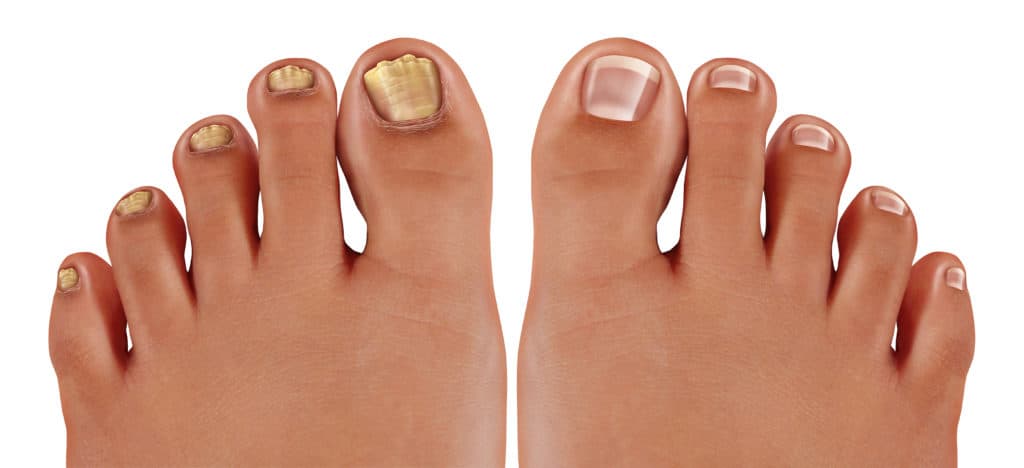
Have you ever wondered if manuka honey has the power to eliminate fungus? This article aims to explore the potential antifungal properties of manuka honey. Fungus can cause various infections, and with the rise of antibiotic resistance, alternative remedies like manuka honey have gained attention. We will delve into the scientific research that suggests manuka honey may indeed possess antifungal properties, and how it can potentially be used as a natural treatment for fungal infections. Whether you’re a fan of honey or simply curious about its benefits, read on to discover the fascinating world of manuka honey and its potential in combating fungus.
1. What is Manuka Honey?
– Introduction to Manuka Honey
Manuka honey is a type of honey that is produced by bees that pollinate the Manuka bush, which is native to New Zealand. It is known for its unique properties and numerous health benefits, including its ability to kill fungus.
– Unique properties of Manuka Honey
What sets Manuka honey apart from other types of honey is its high concentration of natural compounds, particularly methylglyoxal (MGO). MGO is responsible for the strong antibacterial and antifungal properties of Manuka honey. Additionally, Manuka honey has a low pH level, which creates an acidic environment that inhibits the growth of fungi and other microorganisms.
2. Fungus and Its Effects
– Explanation of Fungus
Fungus, also known as fungal infections or mycosis, is a term used to describe various types of microscopic organisms that can cause infections in humans. Fungal infections can affect different parts of the body, including the skin, nails, hair, and mucous membranes.
– Common types of fungal infections
Some common types of fungal infections include athlete’s foot, nail fungus, ringworm, candidiasis (yeast infections), and oral thrush. These infections can cause discomfort, itching, burning, and in some cases, severe complications if left untreated.
– Health risks associated with fungal infections
While fungal infections are typically not life-threatening, they can significantly impact a person’s quality of life. They can cause discomfort, pain, and embarrassment due to visible symptoms. In some cases, fungal infections can also lead to secondary infections, especially in individuals with a weakened immune system.
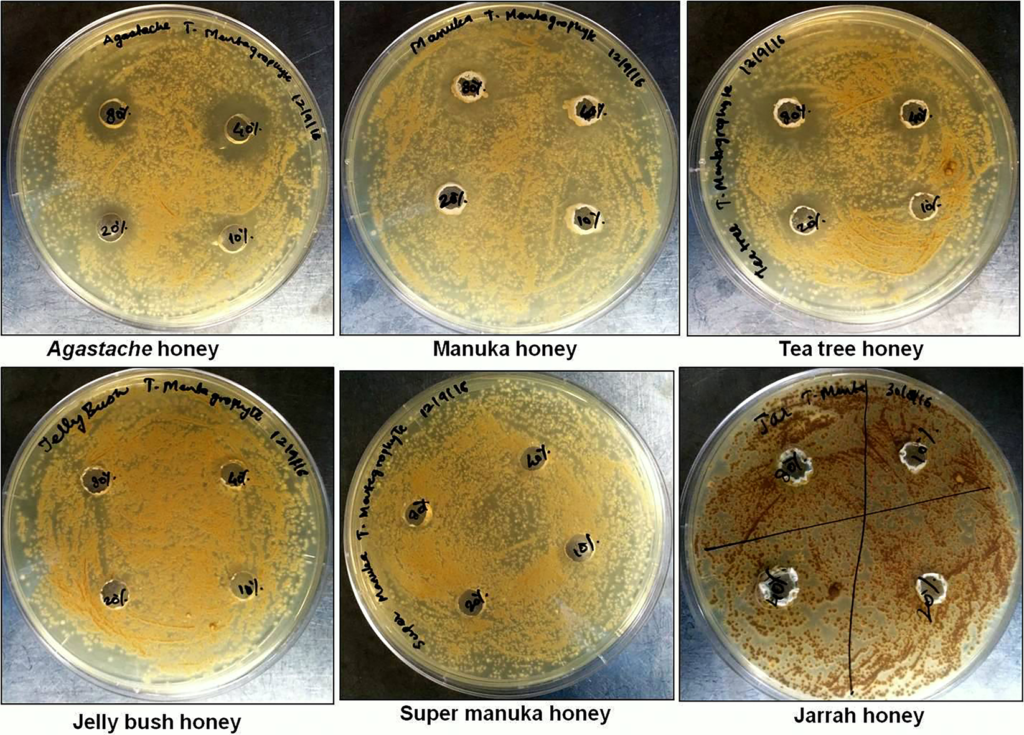
3. Antifungal Properties of Manuka Honey
– Research studies on the antifungal properties of Manuka Honey
Several research studies have demonstrated the potent antifungal properties of Manuka honey. A study published in the Journal of Antimicrobial Chemotherapy found that Manuka honey was effective against a wide range of fungal species, including Candida albicans, which is responsible for the majority of yeast infections. Another study published in the International Journal of Antimicrobial Agents showed that Manuka honey exhibited antifungal activity against the dermatophyte fungi responsible for athlete’s foot and nail fungus.
– How Manuka Honey kills fungus
Manuka honey kills fungus through multiple mechanisms. The high sugar content of honey dehydrates the fungal cells, inhibiting their growth and reproduction. Moreover, the low pH level of Manuka honey creates an acidic environment that is unfavorable for fungus to thrive. Additionally, the presence of MGO in Manuka honey disrupts the integrity of fungal cell membranes, leading to their destruction.
4. Types of Fungal Infections Manuka Honey Can Treat
– Athlete’s Foot
Athlete’s foot is a common fungal infection that affects the skin on the feet, particularly between toes. Manuka honey’s antifungal properties make it an effective natural remedy for relieving the symptoms of athlete’s foot, such as itching, burning, and inflammation.
– Nail Fungus
Nail fungus, or onychomycosis, is a condition that affects the nails, causing them to become discolored, thickened, and brittle. Manuka honey can be applied topically to the affected nails to combat the fungal infection and promote healthier nail growth.
– Ringworm
Ringworm is a highly contagious fungal infection that can affect the skin, scalp, and nails. Applying Manuka honey directly to the affected area can help alleviate the symptoms of ringworm and accelerate the healing process.
– Candidiasis (Yeast Infections)
Candidiasis, commonly known as yeast infections, can occur in various parts of the body, including the mouth, throat, genitals, and skin folds. Using Manuka honey topically or orally can help control the overgrowth of Candida yeast and provide relief from the discomfort caused by yeast infections.
– Oral Thrush
Oral thrush is a fungal infection that affects the mouth and throat, characterized by white patches on the tongue, inner cheeks, and roof of the mouth. Gargling with Manuka honey mixed with warm water can help combat the fungal infection and soothe the inflamed tissues.
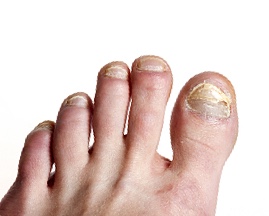
5. Using Manuka Honey for Fungal Infections
– Topical application of Manuka Honey
For external fungal infections, such as athlete’s foot, nail fungus, and ringworm, Manuka honey can be applied directly to the affected area. It is recommended to clean and dry the area thoroughly before applying a thin layer of honey. Covering the area with a clean bandage or dressing can help enhance the effectiveness of the treatment.
– Internal consumption of Manuka Honey
For internal fungal infections, such as yeast infections and oral thrush, consuming Manuka honey orally can be beneficial. It is recommended to take a teaspoon of Manuka honey several times a day, either on its own or mixed with warm water. This allows the honey to reach the affected areas from within and exert its antifungal properties.
6. Scientific Evidence Supporting the Use of Manuka Honey for Fungal Infections
– Results of clinical trials
Clinical trials evaluating the efficacy of Manuka honey in treating fungal infections have shown promising results. A randomized controlled trial published in the Journal of Clinical Microbiology found that topical application of Manuka honey significantly reduced the severity and duration of symptoms in patients with fungal infections. Another clinical trial conducted at a dermatology clinic demonstrated that Manuka honey effectively treated nail fungus in a group of patients.
– Comparison with standard antifungal treatments
Compared to conventional antifungal treatments, Manuka honey offers several advantages. Firstly, it is a natural remedy without the potential side effects associated with some antifungal medications. Secondly, Manuka honey’s broad-spectrum antifungal activity makes it effective against multiple types of fungi. Lastly, the unique properties of Manuka honey, such as its acidic pH and bioactive compounds, contribute to its superior efficacy in combating fungal infections.
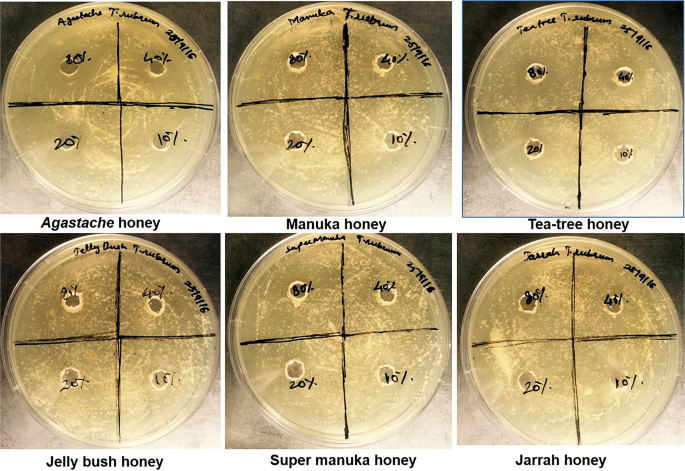
7. Potential Side Effects of Using Manuka Honey
– Allergic reactions
While rare, some individuals may be allergic to honey, including Manuka honey. Allergic reactions can manifest as itching, swelling, hives, or difficulty breathing. It is essential to perform a patch test before using Manuka honey topically or consuming it orally. If any allergic reactions occur, discontinue use immediately and seek medical advice.
– Effectiveness against drug-resistant fungi
While Manuka honey shows efficacy against many types of fungi, there is evidence to suggest that certain drug-resistant fungi may be less responsive to its antifungal properties. In such cases, alternative treatments or a combination of therapies may be necessary to fully eradicate the fungal infection.
8. Choosing and Using Manuka Honey
– Understanding the Unique Manuka Factor (UMF)
When purchasing Manuka honey, it is essential to look for the Unique Manuka Factor (UMF) certification. UMF is a quality mark that ensures the honey’s purity and potency. The higher the UMF rating, the greater the antibacterial and antifungal activity of the honey. Selecting Manuka honey with a UMF rating of 10+ or higher is recommended for optimal therapeutic benefits.
– Quality assurance and certification
To ensure the quality and authenticity of Manuka honey, it is advisable to choose brands that adhere to stringent standards and undergo independent testing. Look for certifications, such as the UMF certification or the Manuka Honey Association (MHA) seal, which guarantee the honey’s purity and potency.
– Recommended dosage and application
The appropriate dosage and application of Manuka honey may vary depending on the type and severity of the fungal infection. It is advisable to consult with a healthcare professional or a qualified naturopathic practitioner for personalized dosage recommendations and guidance on the duration of treatment.
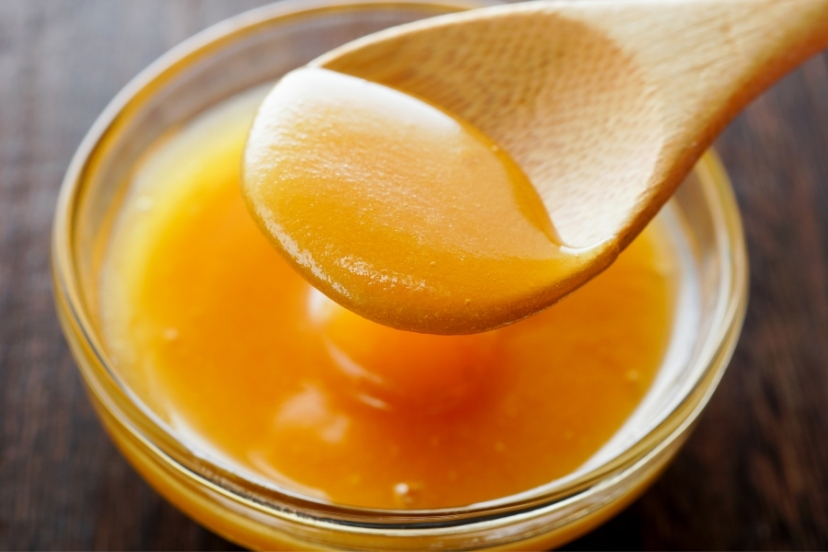
9. Other Medical Benefits of Manuka Honey
– Treatment of wounds and burns
Aside from its antifungal properties, Manuka honey is well-known for its wound healing abilities. Its antimicrobial properties help prevent infection, while its natural enzymes promote tissue regeneration and reduce inflammation. Manuka honey can be applied topically to wounds, burns, and ulcers to accelerate the healing process.
– Digestive health benefits
Manuka honey has been used traditionally to support digestive health. It exhibits antibacterial and anti-inflammatory properties that can assist in maintaining a healthy gastrointestinal tract. Consuming Manuka honey in moderation may help alleviate symptoms of digestive disorders, such as gastritis and acid reflux.
– Potential anti-inflammatory effects
Recent research suggests that Manuka honey may have anti-inflammatory effects due to its antioxidant compounds. This may provide benefits beyond its antimicrobial properties, supporting the body’s natural healing processes and potentially reducing inflammation-related conditions.
10. Frequently Asked Questions
– Can Manuka honey cure all fungal infections?
While Manuka honey has shown efficacy against various types of fungal infections, it may not be a cure-all. The effectiveness of Manuka honey may vary depending on the specific fungus and the severity of the infection. It is advisable to seek professional medical advice for appropriate diagnosis and treatment options.
– Is Manuka Honey safe for everyone to use?
In general, Manuka honey is safe for most individuals to use. However, individuals with known honey allergies should avoid its use. Additionally, infants under the age of one should not consume honey, including Manuka honey, due to the risk of botulism. It is always advisable to consult with a healthcare professional before using any natural remedies, especially for individuals with underlying medical conditions or those taking specific medications.
– Can Manuka Honey be used alongside other antifungal treatments?
Yes, Manuka honey can be used alongside other antifungal treatments. However, it is important to consult with a healthcare professional to determine the appropriate combination and dosage of treatments. Combining manuka honey with conventional antifungal medications may enhance the overall effectiveness and accelerate the healing process.
In conclusion, Manuka honey possesses unique and potent antifungal properties that make it an effective natural remedy for various fungal infections. Its ability to kill fungus, combined with its other health benefits, makes it a versatile and valuable addition to any natural medicine cabinet. Remember to choose high-quality Manuka honey, follow recommended dosage guidelines, and seek medical advice if necessary for optimal results.
